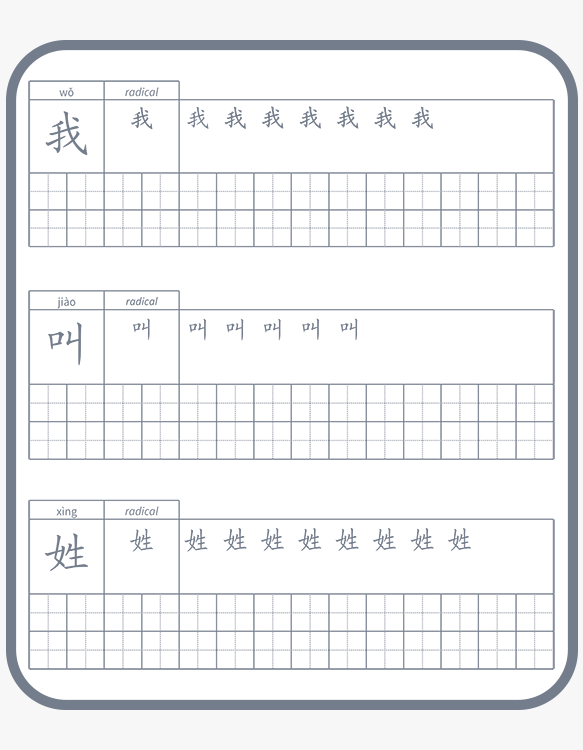Level 3 Lesson 2.1 – 越 生活 活 胖 瘦 爷爷 奶奶
HSK 3+ VOCABULARY: 越 生活 活 胖 瘦 爷爷 奶奶
In this video lesson we'll learn the vocabulary in Lesson 2 and practice them with a lot of example sentences. For new Chinese characters, we'll learn how to write them and know about their structures and origins in the attached writing sheet.
- VOCABULARY: 越 生活 活 胖 瘦 爷爷 奶奶
- CHINESE CHARACTERS: 越 活 胖 瘦 爷
DOWNLOADS
VOCABULARY
| HSK 2.0 |
HSK 3.0 |
CHINESE | PINYIN | P.O.S. | ENGLISH |
|---|---|---|---|---|---|
| 3 | 2 |
越
|
yuè | adv. | indicating change of extent as the condition changes |
| 4 | 2 |
生活
|
shēnghuó | n. / v. | life; to live |
| 4 | 3 |
活
|
huó | v. | (informal) to live |
| 3 | 3 |
胖
|
pàng | adj. | fat; chubby |
| 3 | 5 |
瘦
|
shòu | adj. | skinny; lean; thin |
| 3 | 1 |
爷爷
|
yéye | n. | grandpa; a male senior in general |
| 3 | 1 |
奶奶
|
nǎinai | n. | grandma; a female senior in general |
EXAMPLE SENTENCES
1. 越 yuè · HSK 3
adv. 副词 fùcí ▸ indicating change of extent as the condition changes
It is used in this structure 越来越……, we will learn about it in Lesson 2.2.
2. 生活 shēnghuó · HSK 3
(1) n. 名词 míngcí ▸ life
- shēnghuó xíguàn
生活习惯
life habit - xuéxiào shēnghuò
学校生活
school life - hūn hòu shēnghuó
婚后生活
life (in) (the) time (that is) after getting married
- Māma, wǒ zài Běijīng de shēnghuó hěn hǎo.
妈妈,我在北京的生活很好。
Mom, my life in Beijing (is) pretty good. - Wǒ gèng xǐhuan jiāndǎn de shēnghuó.
我更喜欢简单的生活。
I like simple life better.
(2) v. 动词 dòngcí ▸ to live
- Xiǎo Gāo zài Zhōngguó shēnghuó de hěn kuàile.
小高在中国生活得很快乐。
Little Gao(,) in China(,) lives happily. - Tóngxué men yìqǐ zài zhèlǐ xuéxí、shēnghuó.
同学们一起在这里学习、生活。
The classmates(,) together in here(,) study and live. - Lǎo Zhāng zài Měiguó shēnghuó le hěn jiǔ, yǒu shí jǐ nián le.
老张在美国生活了很久,有十几年了。
Old Zhang(,) in America(,) (has) lived (for) very long, (it has) reached more than 10 years.
3. 活 huó · HSK 3
v. 动词 dòngcí ▸ (usually informal) to live
- Tā hái huó zhe.
他还活着。
He (is) still living. [He is still alive.] - Zhè jǐ nián, wǒ huó de hěn bú kuàilè.
这几年,我活得很不快乐。
These few years, I live very unhappily. - Yīshēng shuō wǒ shēntǐ hěn jiànkāng, hái néng zài huó hěn duō nián!
医生说我身体很健康,还能再活很多年!
(The) doctor says (that) I (-) (the) body (is) very healthy, (that) (I) still can additionally live (for) very many years!
4. 胖 pàng · HSK 3
adj. 形容词 xíngróngcí ▸ overweight; fat; chubby
- Yīshēng shuō wǒ tài pàng le, wǒ yào kāishǐ yùndòng le.
医生说我太胖了,我要开始运动了。
(The) doctor says (that) I (am) overweight, I plan/need to start to exercise (already). - Nǐ shuō shénme ne? Nǐ bú pàng.
你说什么呢?你不胖。
What are you talking about? You (are) not overweight. - Nà ge háizi pàngpàng de, yǎnjing dàda de, dàjiā dōu tèbié xǐhuan tā.
那个孩子胖胖的,眼睛大大的,大家都特别喜欢他。
That child (is so) chubby, (his) eyes (are so) big, everyone all adores him very much.
5. 瘦 shòu · HSK 3
adj. 形容词 xíngróngcí ▸ 不胖; skinny; lean; thin
- Nǐ shòu le!
你瘦了!
You lost some weight! - Hé nánpéngyou fēnshǒu yǐshòu, Xiǎohóng hěn kuài jiù shòu le hěnduō.
和男朋友分手以后,小红很快就瘦了很多。
(In the) time (that is) after breaking up with her boyfriend, Xiaohong lost much weight very quickly. - Tā shòushòu de、gāogāo de, gēn tā māma yíyàng piàoliang.
她瘦瘦的、高高的,跟她妈妈一样漂亮。
She (is so) skinny (and so) tall, the same pretty as her mom. - Zhǎng de tài shòu le bù hǎo kàn.
长得太瘦了不好看。
Appearing too skinny (is) not good-looking.
6. 爷爷 yéye · HSK 3
n. 名词 míngcí ▸ grandpa; a male senior in general
- Wǒ bàba de míngzi gēn wǒ yéye yíyàng.
我爸爸的名字跟我爷爷一样。
My dad's name (is) the same as my grandpa's name. - Zhè shì wǒ gěi yéye zhǔnbèi de lǐwù.
这是我给爷爷准备的礼物。
This is (the) gift (that) I prepared for grandpa.
- Línjū Zhāng Yéye yǒu yí ge xíguàn, jiù shì měitiān zǎoshang sànbù yí ge xiǎoshí.
邻居张爷爷有一个习惯,就是每天早上散步一个小时。
(Our) neighbor Grandpa Zhang has one "ge" (of) habit, (and it) is just to walk (for) one "ge" (of) hour every morning. - Lǎo Yéye nín hǎo, qǐngwèn "Pǔ'ài" Yīyuàn zài nǎlǐ?
老爷爷您好,请问"普爱"医院在哪里?
Excuse me senior grandpa, where is "Pu'ai" Hospital?
7. 奶奶 nǎinai · HSK 3
n. 名词 míngcí ▸ grandma; a female senior in general
- Bàba, nǎinai shì shénme shíhou gēn yéye jié de hūn.
爸爸,奶奶是什么时候跟爷爷结的婚?
Dad, when was (it that) grandma and grandpa got married? - Wǒ nǎinai yǒu liǎng ge érzi sān ge nǚ'ér.
我奶奶有两个儿子三个女儿。
My grandma has two sons (and) three daughters.
1 Comment
Leave a Reply
You must be logged in to post a comment.

Very much enjoying your lessons. In just a few weeks my comfort level when speaking has truly increased and I feel much more confident. Thank you.